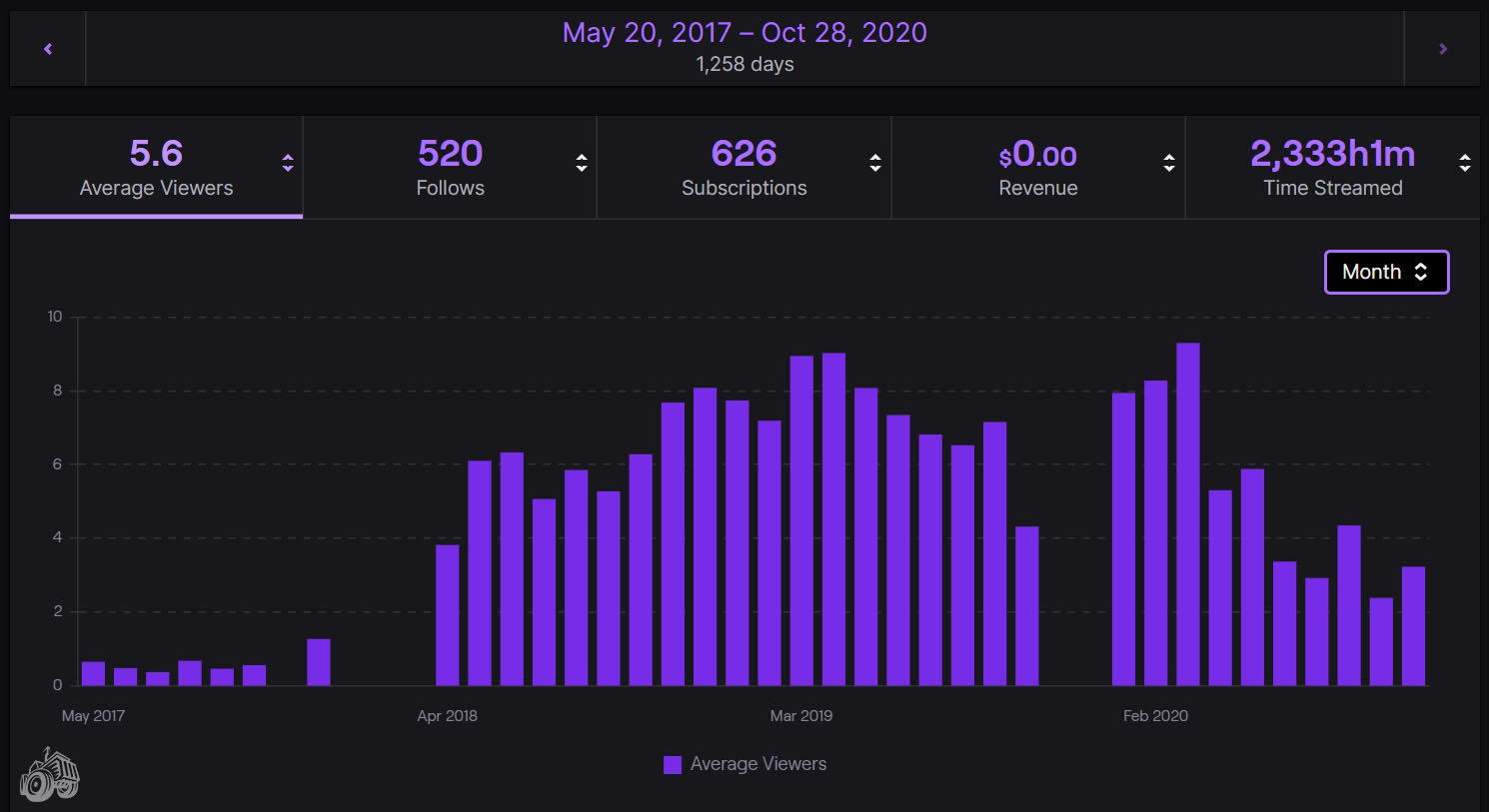
Post-mortem: Twitch
I created a Justin.tv account on February 17, 2012. I don’t remember why. I didn’t do my first livestream until some time around the end April/start of March, 2014. I’d gotten into Elder Scrolls Online, was at the tail end of my first stint as a solo indie game developer, and livestreaming was starting to gain widespread recognition. I went live with an old Astro headset and no facecam. I did two streams of Elder Scrolls Online of about an hour each, and then forgot about all about it until the summer of 2016 when I learned about a certain livestreamer by the name of Dr. Disrespect (Doc).
I’d been busy upgrading my maths in preparation for a run at a computer science degree, and I spent my afternoons in the library. I would alternate between studying the textbook and playing Hearthstone.
I started ‘streaming again on Saturday, May 20, 2017. I had the kernel of what was to become "Dark Acre Church", but it needed time in the oil to pop. It would take a little over 2 months to figure out the proper flow, but by the start of August that year I had a formula that would go largely unchanged right up until the end.
I started watching Hammyjay (Hammy) around the time I figured out the Church formula. Up until then I’d been a Dr. Disrespect subscriber, and hadn’t really been interested in any other ‘streamers. I’d seen Doc getting massive donations, and at that time he’d kept a top 10 list in the info panels on his Twitch page. I don’t think Hammy had been the "top D", but he was near the top. I mistakenly found myself in Hammy the Law’s channel.
I could never get my head around the networking aspect. The most often recommended method for growing an audience is to go into other similar-sized channels. You’re supposed to participate in those communities until you get noticed, and then enjoy a nepotistic cross-pollination of viewers. This is what actually happened with the core Church audience. All of the regular viewers were from a small circle of tiny streamers that had orbited Hammy. Now, I never hung around in Hammy’s channel with the intent of promoting myself. In fact, he didn’t learn I was a broadcaster for months. I think he found out due to one of his roommates checking me out, and becoming addicted to the replay (VOD) content. After that, Hammy would regularly mention me during his shows. It wasn’t long before folks started showing up for Church, and it was a couple of months after that I got affiliate status.
My last ‘stream on Twitch was October 28, 2020. I had produced 512 episodes of Church in 3 years and 3 months, and 40 "let’s play" type broadcasts. There were a handful of random ‘streams in there, but I never felt comfortable going live for the sake of going live. I always needed a structure. I wanted to provide a complete performance experience with a beginning, middle, and end. I also despised just springing a show on people. It needed to be scheduled, and it needed to be consistent.

I know it’s foolish to have any kind of expectations regarding a hit-driven business. I’ve been down that road before. But there was something profoundly depressing to me about working for 4 years to gather a regular audience of 10 to 20. It had been that way for a couple of years, despite improving quality and doing everything that’s supposed to encourage growth.
There were some other broadcasters I’d been watching who were “blowing up”, pulling 50 to 300 concurrent viewers. A couple had running subscriber counts, so it made it very easy to conduct a little research through the VODs. Even these outwardly successful streams weren’t pulling down wads of subscriptions, donations, or even chat interaction. I started to believe that the threshold for really making the broadcasts worthwhile had grown too high to surmount.
There were also a good number of folks the in Twitch social circle that expanded from Hammy’s orbit to mine. These people were also chasing the “stream dream”. I believe that the majority of people who livestream do so with at least a faint hope that they could blow it up into financially sustainable enterprise. As of this post, 3 of 10 have continued to maintain any sort of schedule, and only 1 of those is averaging over 20 viewers per stream.
Having not streamed for 4 months has given me a lot of perspective. It took more than a month to get over the urge to not play a videogame because I wasn’t streaming. It felt like I would be wasting an opportunity to create content. Taken objectively, I was denying myself the pleasure of playing a game simply because I wouldn’t be doing it for an audience. I sppoke with some former streamers, and I’m not alone in that feeling. Getting past that was great, though. Livestreaming a game takes away something from the experience.
Trying for success in any hit-driven business is like standing out in a thunderstorm and hoping you’ll get struck by lightning. The thing is, there’s literally millions of other people out in that same storm standing next to you. Some of them have spent years learning how to improve their chances of getting hit. Yet, at the end of the day, there’s still only that miniscule chance that it’ll happen. And I’m not talking about f-you money levels of success here. I’m just talking minimum wage kinda success.
And like any true, lottery-like windfall, it’s going to happen to the ones who aren’t even trying. Because these kinds of fates don’t give a good gosh darn about who you are and what you’ve been doing.
At what point do you look at the metrics and realize that you’re playing the lottery? You’ve been livestreaming on schedule, showing up on time—3, 4, 5 times a week—tweeting it out, using the hashtags, cross-pollinating on YouTube and TikTok and whatever other faucet your content can pour from, and the numbers just aren’t going up. You’re not growing "organically", whatever that means. You’re praying for someone bigger than you to notice you, and send their own hard-won audience your way, so that you might sop up a few of the crumbs that decide to stay on the plate once the raid is over. You’re playing the lottery, but not with money. You’re gambling with time and your own mental well-being.
I should’ve quit after three months. Instead, I took nearly four years to come to the realization that all I really wanted to do was watch Doc.
2023.05.10